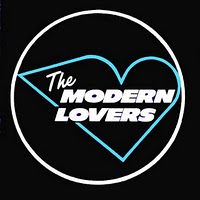 This albums flawlessness is unparalleled. Jonathan Richman has crafted an ideal record that is filled with exceptional songs. “Pablo Picasso” has to be one of my favorites. I can never get enough of it and “Hospital” is right there alongside it. Just beautiful love stories told with such panache and Richman’s voice is perfectly suited with each spoken word. Listening to “Hospital” is heartrending, but when reading the lyrics it’s almost like a six year old wrote it. But, this album is anything but ordinary. It’s a candid masterpiece that ranks at the top of all my lists. –Jason
This albums flawlessness is unparalleled. Jonathan Richman has crafted an ideal record that is filled with exceptional songs. “Pablo Picasso” has to be one of my favorites. I can never get enough of it and “Hospital” is right there alongside it. Just beautiful love stories told with such panache and Richman’s voice is perfectly suited with each spoken word. Listening to “Hospital” is heartrending, but when reading the lyrics it’s almost like a six year old wrote it. But, this album is anything but ordinary. It’s a candid masterpiece that ranks at the top of all my lists. –Jason
Album Reviews
Jethro Tull “Stand Up” (1969)
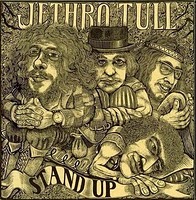 First off, let me confess that I don’t particularly like Jethro Tull. I find their output longwinded, pompous, tedious and dull … except for this record, which I inexplicably adore. There’s a light, airy feel to even the hard rock numbers here, while the music effortlessly fuses elements of rock, folk, blues and classical. The rhythm section — Glenn Cornick’s melodic bass and Clive Bunker’s steady-as-she-goes drumming — anchors the songs, which are gentle, wistful and delicate … not generally words I’d associate with Ian Anderson. Everything works — the bouzouki-driven “Fat Man”, the gorgeous ballad “Look Into The Sun”, the intense rock of “A New Day Yesterday”, the Bach arrangement “Bouree” … Yes folks, there was a time when Tull “had it”. Sadly, apart from a couple of singles recorded around the same time (notably “Living In The Past”), the band would move onto other (in my opinion, less rewarding) territory. Fact is, not even their next album, Benefit, sounds like Stand Up. By far their crowning achievement. –Tom
First off, let me confess that I don’t particularly like Jethro Tull. I find their output longwinded, pompous, tedious and dull … except for this record, which I inexplicably adore. There’s a light, airy feel to even the hard rock numbers here, while the music effortlessly fuses elements of rock, folk, blues and classical. The rhythm section — Glenn Cornick’s melodic bass and Clive Bunker’s steady-as-she-goes drumming — anchors the songs, which are gentle, wistful and delicate … not generally words I’d associate with Ian Anderson. Everything works — the bouzouki-driven “Fat Man”, the gorgeous ballad “Look Into The Sun”, the intense rock of “A New Day Yesterday”, the Bach arrangement “Bouree” … Yes folks, there was a time when Tull “had it”. Sadly, apart from a couple of singles recorded around the same time (notably “Living In The Past”), the band would move onto other (in my opinion, less rewarding) territory. Fact is, not even their next album, Benefit, sounds like Stand Up. By far their crowning achievement. –Tom
David Axelrod “Song of Innocence” (1968)
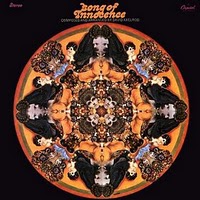 Trying to put a tag on the music of legendary producer David Axelrod is almost impossible as his music, especially [when] early offerings such as this, straddles so many genres. You get funk, jazz, classical and rock all thrown into the melting pot to create a rather unique sound that has had a large influence on many people. Nowhere has this been more apparent than in hip hop and trip hop where this LP has been heavily sampled. If you are a fan of those two genres prepare to hear a lot of familiar breaks when you hear this record for the first time. The LP itself was heavily influenced by the poetry of William Blake hence there is a dark brooding feel throughout and Axelrod uses layers of strings playing minor keys to obtain this mood. The drums and percussion drive the music on and there are some fantastic guitar breaks. –Jon
Trying to put a tag on the music of legendary producer David Axelrod is almost impossible as his music, especially [when] early offerings such as this, straddles so many genres. You get funk, jazz, classical and rock all thrown into the melting pot to create a rather unique sound that has had a large influence on many people. Nowhere has this been more apparent than in hip hop and trip hop where this LP has been heavily sampled. If you are a fan of those two genres prepare to hear a lot of familiar breaks when you hear this record for the first time. The LP itself was heavily influenced by the poetry of William Blake hence there is a dark brooding feel throughout and Axelrod uses layers of strings playing minor keys to obtain this mood. The drums and percussion drive the music on and there are some fantastic guitar breaks. –Jon
They Might Be Giants “They Might Be Giants” (1986)
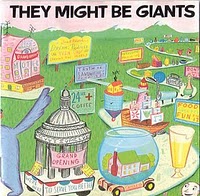 Quite the mixed bag, but the goodness is really good (“Don’t Lets Start”, “Youth Culture Killed My Dog”, “Boat of Car”) and the badness is gone before you know it (“Rabid Child”, “(She Was) A Hotel Detective”, “Chess Piece Face”), washed away in the swift flow of quirky tunes and strange ideas that make up TMBG’s debut album. And you’ll likely disagree with my choices for good and bad, as well, since everything here is so eclectic. It’s hard for me to take any of this too seriously, because the band ly doesn’t, but as usual, they always sprinkle in enough food for thought and maybe-profound lyrics that it doesn’t desolve into complete camp. In this early stage of their career, they kind of sound like a mix between the Residents and Weird Al. Only better than that description sounds. Soon, they would refine their aesthetic and make more fully realized statements. –Lucas
Quite the mixed bag, but the goodness is really good (“Don’t Lets Start”, “Youth Culture Killed My Dog”, “Boat of Car”) and the badness is gone before you know it (“Rabid Child”, “(She Was) A Hotel Detective”, “Chess Piece Face”), washed away in the swift flow of quirky tunes and strange ideas that make up TMBG’s debut album. And you’ll likely disagree with my choices for good and bad, as well, since everything here is so eclectic. It’s hard for me to take any of this too seriously, because the band ly doesn’t, but as usual, they always sprinkle in enough food for thought and maybe-profound lyrics that it doesn’t desolve into complete camp. In this early stage of their career, they kind of sound like a mix between the Residents and Weird Al. Only better than that description sounds. Soon, they would refine their aesthetic and make more fully realized statements. –Lucas
The Beatles “Magical Mystery Tour” (1967)
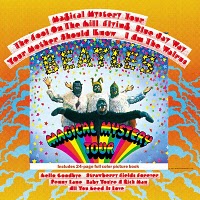 Released only a few months after Sgt. Pepper’s, Magical Mystery Tour had mighty big shoes to fill. Despite its expected chartbuster sales figures, many felt let down by what seemed a musical afterthought. Being guilty by association with the only truly lame Beatles film, sporting an unbecomingly goofy cover, and appearing to be yet another Capitol Records “hatchet job” release, it seemed doomed to a lifetime of disrespect from the start. But over time this lovable underdog has solidified itself both as a fine collection of songs and an essential document of a band just moments away from the most dramatic artistic shift of its career. MMT represents the triumphant last hurrah of the “Psychedelic Beatles”. While the iconic “I am the Walrus” is certainly its most famous example, Harrison’s lost-in-the-fog dirge, “Blue Jay Way”, delivers its most profoundly surreal moment. In fact, it’s the seldom-heard-elsewhere obscurities that propel MMT to greatness: “Your Mother Should Know”, a nugget of Macca’s sterling pop songcraft; the dreamy “Flying”, the only instrumental to ever make it on to a proper Beatles LP; and “Baby You’re a Rich Man”, their catchiest-ever non-hit. Sure, there are the hits too, but these somehow coexist with their less radio-saturated counterparts. While “Penny Lane” and “Strawberry Fields Forever” were released as a double A-side almost a year before, their absence here would be unthinkable. And “All You Need is Love”, originally recorded for an unrelated global telecast, ends up providing one of the greatest album closers in history. UK fans remain critical, perhaps justifiably; they got a much shorter EP version. But years later, when reconnoitering the British albums for release on CD, Apple decided that this superior version of MMT would join the ranks of the Beatles’ “Core Catalog” thus conceding that –- just this once -– Capitol got it right. – Richard
Released only a few months after Sgt. Pepper’s, Magical Mystery Tour had mighty big shoes to fill. Despite its expected chartbuster sales figures, many felt let down by what seemed a musical afterthought. Being guilty by association with the only truly lame Beatles film, sporting an unbecomingly goofy cover, and appearing to be yet another Capitol Records “hatchet job” release, it seemed doomed to a lifetime of disrespect from the start. But over time this lovable underdog has solidified itself both as a fine collection of songs and an essential document of a band just moments away from the most dramatic artistic shift of its career. MMT represents the triumphant last hurrah of the “Psychedelic Beatles”. While the iconic “I am the Walrus” is certainly its most famous example, Harrison’s lost-in-the-fog dirge, “Blue Jay Way”, delivers its most profoundly surreal moment. In fact, it’s the seldom-heard-elsewhere obscurities that propel MMT to greatness: “Your Mother Should Know”, a nugget of Macca’s sterling pop songcraft; the dreamy “Flying”, the only instrumental to ever make it on to a proper Beatles LP; and “Baby You’re a Rich Man”, their catchiest-ever non-hit. Sure, there are the hits too, but these somehow coexist with their less radio-saturated counterparts. While “Penny Lane” and “Strawberry Fields Forever” were released as a double A-side almost a year before, their absence here would be unthinkable. And “All You Need is Love”, originally recorded for an unrelated global telecast, ends up providing one of the greatest album closers in history. UK fans remain critical, perhaps justifiably; they got a much shorter EP version. But years later, when reconnoitering the British albums for release on CD, Apple decided that this superior version of MMT would join the ranks of the Beatles’ “Core Catalog” thus conceding that –- just this once -– Capitol got it right. – Richard
Cannonball Adderley “At the Lighthouse” (1961)
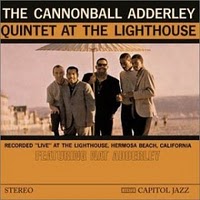 Cannonball Adderley is a tremendously joyful performer. It’s the trait that makes him such a great foil for melancholy Miles on their collaborations. It’s also the trait that makes At the Lighthouse such a beautiful album. A lot of jazz music is aimed at expanding boundaries, or breaking them down entirely. A great deal of the most highly regarded work is exploratory in nature, and that exploration can be breath-taking. There is something to be said, however, for simplicity. The musicians on At the Lighthouse never force a note. Each solo is in complete service of the song, rather than taking the first opportunity to bust free of the song’s framework. The rhythm section of Sam Jones and, particularly, drummer Louis Hayes are economical and straight-forward. Adderley and his brother Nat deliver lovingly crafted solos and have a precise but easy-going chemistry when playing together. The real stand-out, in my mind, is pianist Victor Feldman. He always waits patiently for his solo (always third) and accentuates the rhythm section. Then, he takes the reigns and delivers these long, eloquent solos while still helping to propel the song along. Really lovely stuff. If your thing is Ascension and The Shape of Jazz to Come, and you’re only interested in the outer edge of jazz, then this album may not be for you. If you just love great music, however, then this magical, casual recording of a night at a club in 1960 will make you smile, guaranteed. –Lucas
Cannonball Adderley is a tremendously joyful performer. It’s the trait that makes him such a great foil for melancholy Miles on their collaborations. It’s also the trait that makes At the Lighthouse such a beautiful album. A lot of jazz music is aimed at expanding boundaries, or breaking them down entirely. A great deal of the most highly regarded work is exploratory in nature, and that exploration can be breath-taking. There is something to be said, however, for simplicity. The musicians on At the Lighthouse never force a note. Each solo is in complete service of the song, rather than taking the first opportunity to bust free of the song’s framework. The rhythm section of Sam Jones and, particularly, drummer Louis Hayes are economical and straight-forward. Adderley and his brother Nat deliver lovingly crafted solos and have a precise but easy-going chemistry when playing together. The real stand-out, in my mind, is pianist Victor Feldman. He always waits patiently for his solo (always third) and accentuates the rhythm section. Then, he takes the reigns and delivers these long, eloquent solos while still helping to propel the song along. Really lovely stuff. If your thing is Ascension and The Shape of Jazz to Come, and you’re only interested in the outer edge of jazz, then this album may not be for you. If you just love great music, however, then this magical, casual recording of a night at a club in 1960 will make you smile, guaranteed. –Lucas
The Rolling Stones “Sticky Fingers” (1971)
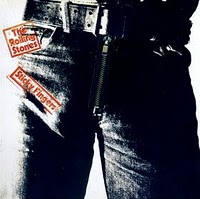 The Stones in peak form, having with this album reached the point where everything always seems just on the verge of falling apart (listen to that lazy backbeat on “Sway,” easily one of their greatest songs; the chorus of “Can’t You Hear Me Knocking,” with its vocal declamation/piano vamping/guitar sliding just off-kilter enough to be note-perfect). One of the few rock albums to utilize horns and strings with proper contextuality (only to be outdone with their next release…): rather than filling in space or adding some “mood” or “colour,” these additions flesh out the emotional range of the songs themselves (as does the Santana-lite jam at the end of “CYHMK’ing”, with its suspenseful repetition and restraint). Despite being nearly killed by FM radio, “Brown Sugar” remains a perfect opener, with that fantastic electric/acoustic guitar interplay and the castanets, which burst in through the saloon doors and swagger on up to the bar, but only hint at the brash, swaggering shitkicking that the listener gets from this album. “Moonlight Mile” is a perfect closer, sleepy, resigned, yet ecstatic. The sleaze factor also helps (packaging and all), what with the sex and drugs and generally foggy malaise over the whole thing, letting the highs really rise in contrast. They couldn’t consciously make an album this good – it ain’t about consciousness, it’s about guitar, bass, and drums. –Will
The Stones in peak form, having with this album reached the point where everything always seems just on the verge of falling apart (listen to that lazy backbeat on “Sway,” easily one of their greatest songs; the chorus of “Can’t You Hear Me Knocking,” with its vocal declamation/piano vamping/guitar sliding just off-kilter enough to be note-perfect). One of the few rock albums to utilize horns and strings with proper contextuality (only to be outdone with their next release…): rather than filling in space or adding some “mood” or “colour,” these additions flesh out the emotional range of the songs themselves (as does the Santana-lite jam at the end of “CYHMK’ing”, with its suspenseful repetition and restraint). Despite being nearly killed by FM radio, “Brown Sugar” remains a perfect opener, with that fantastic electric/acoustic guitar interplay and the castanets, which burst in through the saloon doors and swagger on up to the bar, but only hint at the brash, swaggering shitkicking that the listener gets from this album. “Moonlight Mile” is a perfect closer, sleepy, resigned, yet ecstatic. The sleaze factor also helps (packaging and all), what with the sex and drugs and generally foggy malaise over the whole thing, letting the highs really rise in contrast. They couldn’t consciously make an album this good – it ain’t about consciousness, it’s about guitar, bass, and drums. –Will
Centipede “Septober Energy” (1971)
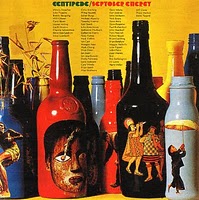 This ominous double LP has been sitting there in my record collection since 1973. I don’t know why I haven’t played it for ages, I used to play it a lot. So, the first of October is an apt day to play and review Septober Energy. It is a project assembled by Keith Tippett and produced by Robert Fripp (both members of King Crimson at the time). These two gathered virtually the entire creative British music scene – a who-is-who of some 50 musicians, horns, brass, strings, singers, Alan Skidmore, Elton Dean, Ian Carr, Alan Skidmore, Paul Rutherford, John Marshall, Robert Wyatt, Ian MacDonald, Boz Burrell, Julie Driscoll (Tippett at the time of recording), just to name a few. The music sounds as if Tippett and Fripp were struggling to find a home for their jazzier, freer ideas which they couldn’t incorporate into the King Crimson concept.
This ominous double LP has been sitting there in my record collection since 1973. I don’t know why I haven’t played it for ages, I used to play it a lot. So, the first of October is an apt day to play and review Septober Energy. It is a project assembled by Keith Tippett and produced by Robert Fripp (both members of King Crimson at the time). These two gathered virtually the entire creative British music scene – a who-is-who of some 50 musicians, horns, brass, strings, singers, Alan Skidmore, Elton Dean, Ian Carr, Alan Skidmore, Paul Rutherford, John Marshall, Robert Wyatt, Ian MacDonald, Boz Burrell, Julie Driscoll (Tippett at the time of recording), just to name a few. The music sounds as if Tippett and Fripp were struggling to find a home for their jazzier, freer ideas which they couldn’t incorporate into the King Crimson concept.
There are moments of grandezza, pathos, Jazz-Rock passages, Free Jazz – both loud and aggressive and soft and gentle, Bolero-like crescendos, concert music, sheet music, smashing arrangements and orchestrations, all of it played live in the studio and simultaneously recorded. Of course, due to the concept, there are also passages which don’t succeed or which are too long – I’m thinking of the finale. Septober Energy has been put down as megalomania, usually from King Crimson fans. I don’t agree. It’s difficult music, certainly. You have to make an effort to follow the music. It might just not be your taste. But that doesn’t make it a flop. Septober Energy is like nothing else from the early seventies, it’s an important musical document from one of the most exiting musical phases in the twentieth century. I’m glad I re-discovered this album. It’s out on CD and should not be overlooked. –Yofriend
The Allman Brothers Band “At Fillmore East” (1971)
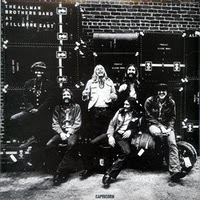 If I was pressed to name the most talented rock band, in terms of pure ability to play their instruments, I would choose the Allman Brothers. The first three tracks, standard blues fair, won’t win any converts. They are played very well, of course, but they’re just the appetizer for the main course. The 20-minute “You Don’t Love Me” kicks off the awe-inspiring portion of the album, show-casing the band’s brilliant interplay and individual contributions. Then, amazingly, “Hot ‘Lanta” does the same thing, even better, in just over five minutes. Finally, “In Memory of Elizabeth Reed” and “Whipping Post” deliver 30-plus minutes of the greatest live rock performance I’ve ever heard. The communication between the entire band verges on telepathic, but you’d have to come up with a new super-power to describe the connection between Dickie and Duane. With most live recordings, I get bored by the time a song hits the six-minute mark. Here, even the ample running time seems cruelly short. –Lucas
If I was pressed to name the most talented rock band, in terms of pure ability to play their instruments, I would choose the Allman Brothers. The first three tracks, standard blues fair, won’t win any converts. They are played very well, of course, but they’re just the appetizer for the main course. The 20-minute “You Don’t Love Me” kicks off the awe-inspiring portion of the album, show-casing the band’s brilliant interplay and individual contributions. Then, amazingly, “Hot ‘Lanta” does the same thing, even better, in just over five minutes. Finally, “In Memory of Elizabeth Reed” and “Whipping Post” deliver 30-plus minutes of the greatest live rock performance I’ve ever heard. The communication between the entire band verges on telepathic, but you’d have to come up with a new super-power to describe the connection between Dickie and Duane. With most live recordings, I get bored by the time a song hits the six-minute mark. Here, even the ample running time seems cruelly short. –Lucas
Starcastle “Starcastle” (1976)
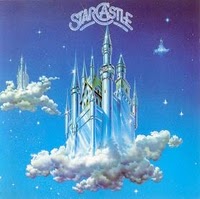 Imagine a group of children raised in total isolation, their only stimulus coming from daily spinnings of Fragile and Close to the Edge. If they were to grow up and make an album of their own, it would be Starcastle. Long-winded compositions full of buzzing Rickenbacker bass, precision drumming and hot shot guitars, a Wakeman-esque pallet of synth tones, and high-pitched vocals delivering nonsensical lyrics of elemental wonder, it’s all here. If there’s anything to separate Starcastle from Yes, it’s that the ‘castle seem to be even more uncompromising in their devotion to the most progressive elements of the sound, generally eschewing the sense of pop smarts that handed Yes a few hits and radio favorites along the way, in favor of a rabid working of the ornate and extravagant end of the spectrum. Yeah, it’s derivativeness is obvious, but it doesn’t change the fact that Starcastle still plays like a wet dream for acne-scarred starship troopers. –Ben
Imagine a group of children raised in total isolation, their only stimulus coming from daily spinnings of Fragile and Close to the Edge. If they were to grow up and make an album of their own, it would be Starcastle. Long-winded compositions full of buzzing Rickenbacker bass, precision drumming and hot shot guitars, a Wakeman-esque pallet of synth tones, and high-pitched vocals delivering nonsensical lyrics of elemental wonder, it’s all here. If there’s anything to separate Starcastle from Yes, it’s that the ‘castle seem to be even more uncompromising in their devotion to the most progressive elements of the sound, generally eschewing the sense of pop smarts that handed Yes a few hits and radio favorites along the way, in favor of a rabid working of the ornate and extravagant end of the spectrum. Yeah, it’s derivativeness is obvious, but it doesn’t change the fact that Starcastle still plays like a wet dream for acne-scarred starship troopers. –Ben
Grateful Dead “Grateful Dead” (1967)
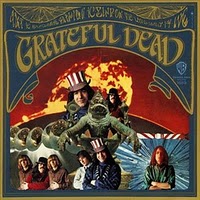 The Dead were never a studio band, and their first record is even overlooked by the most ardent Deadheads. It’s easy to see why; here they sound more like a garage band: raw, loud, way fast, and with only one drummer! Recorded in LA, it’s rumored that the band cut these tracks in just a few hours while hopped up on Ritalin (an irony considering the superhuman attention span required for the long-winded jams of their later years). The opener, “The Golden Road…” sets the momentum for a series of short, bluesy, breakneck tempo numbers that don’t slow down until the beginning of Side Two: a cover of Bonnie Dobson’s post-apocalyptic “Where is everybody?” ballad, “Morning Dew”. But even here there’s a sense of visceral urgency that the band seldom recaptured on stage or off. The closing prison song cover, “Viola Lee Blues”, more closely resembles the exploratory and improvisational sound that would soon become their stock in trade, but with just enough sloppiness and dissonance to keep things interesting. From here, the Dead would inarguably record and perform some more great music while vocalist/organist Pigpen still had his liver, but never again with such reckless abandon. –Richard P
The Dead were never a studio band, and their first record is even overlooked by the most ardent Deadheads. It’s easy to see why; here they sound more like a garage band: raw, loud, way fast, and with only one drummer! Recorded in LA, it’s rumored that the band cut these tracks in just a few hours while hopped up on Ritalin (an irony considering the superhuman attention span required for the long-winded jams of their later years). The opener, “The Golden Road…” sets the momentum for a series of short, bluesy, breakneck tempo numbers that don’t slow down until the beginning of Side Two: a cover of Bonnie Dobson’s post-apocalyptic “Where is everybody?” ballad, “Morning Dew”. But even here there’s a sense of visceral urgency that the band seldom recaptured on stage or off. The closing prison song cover, “Viola Lee Blues”, more closely resembles the exploratory and improvisational sound that would soon become their stock in trade, but with just enough sloppiness and dissonance to keep things interesting. From here, the Dead would inarguably record and perform some more great music while vocalist/organist Pigpen still had his liver, but never again with such reckless abandon. –Richard P
The Replacements “Tim” (1985)
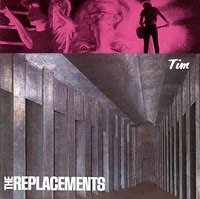 After the skillful Let It Be, Paul Westerberg and the boys decided to make another essential classic rock album, only this time they got even better. Tim is loaded up with first-rate tunes such as the lasting “Bastards of Young” accompanied with the sweet “Kiss Me on the Bus.” Let’s not forget the sacred “Left of the Dial” and the touching “Here Comes a Regular.” One of my personal favorites is “Swingin’ Party,” it’s so catchy and complete with solitude that it’s one of the very few songs I never get tired of. “Hold My Life” is terrific and “Little Mascara” is compelling at times. Every last song on this disc is superlative rock ‘n’ roll. If I was pressed to make a pick for the must hear Replacements album, it just might have to go to Tim. How this wasn’t one of the best selling albums of the 80’s is beyond me. –Jason
After the skillful Let It Be, Paul Westerberg and the boys decided to make another essential classic rock album, only this time they got even better. Tim is loaded up with first-rate tunes such as the lasting “Bastards of Young” accompanied with the sweet “Kiss Me on the Bus.” Let’s not forget the sacred “Left of the Dial” and the touching “Here Comes a Regular.” One of my personal favorites is “Swingin’ Party,” it’s so catchy and complete with solitude that it’s one of the very few songs I never get tired of. “Hold My Life” is terrific and “Little Mascara” is compelling at times. Every last song on this disc is superlative rock ‘n’ roll. If I was pressed to make a pick for the must hear Replacements album, it just might have to go to Tim. How this wasn’t one of the best selling albums of the 80’s is beyond me. –Jason


